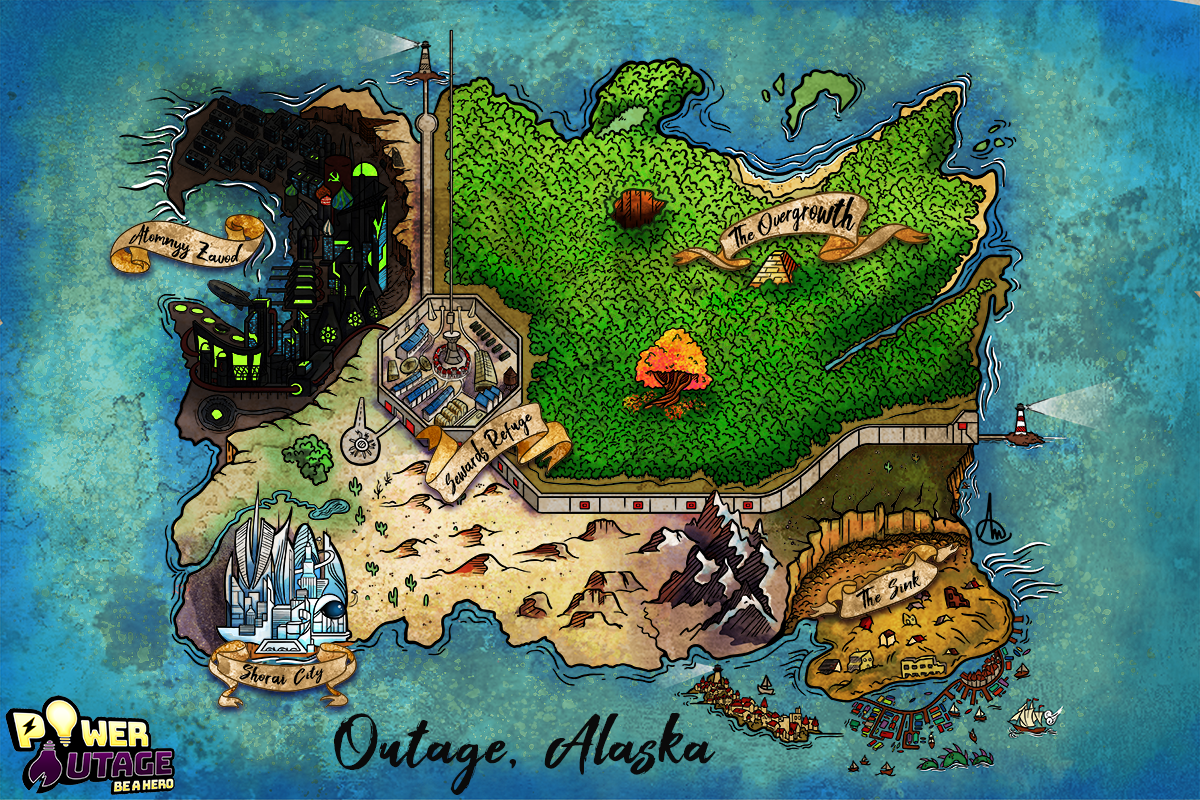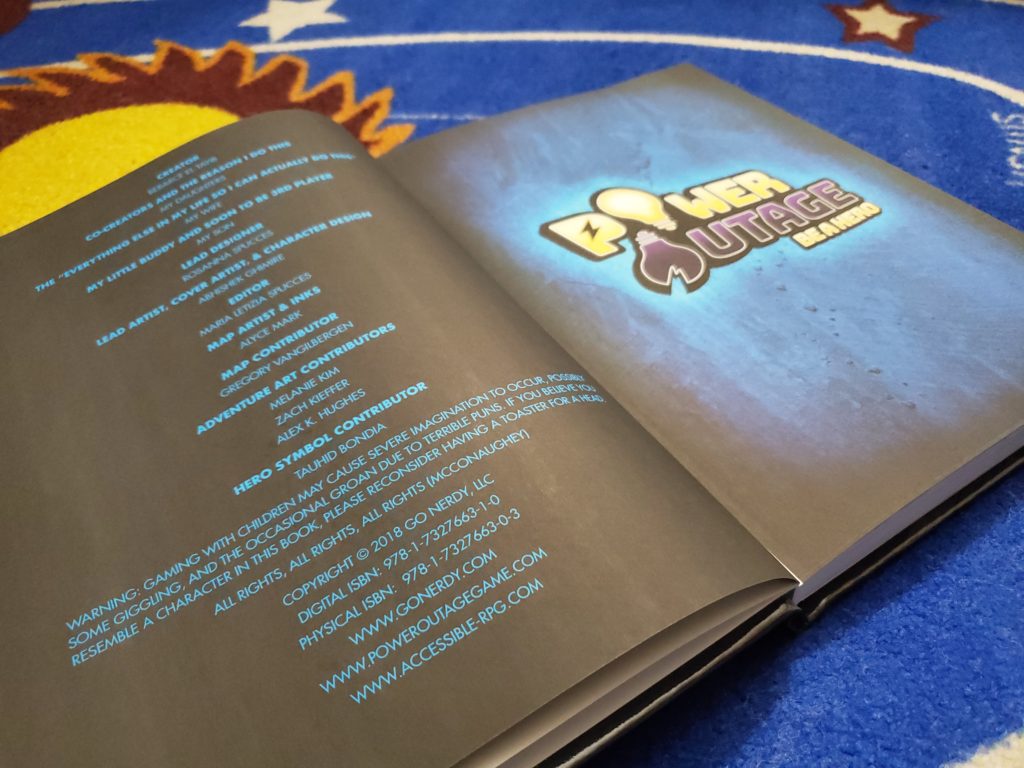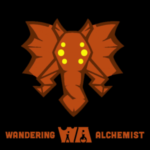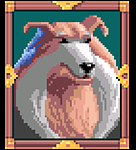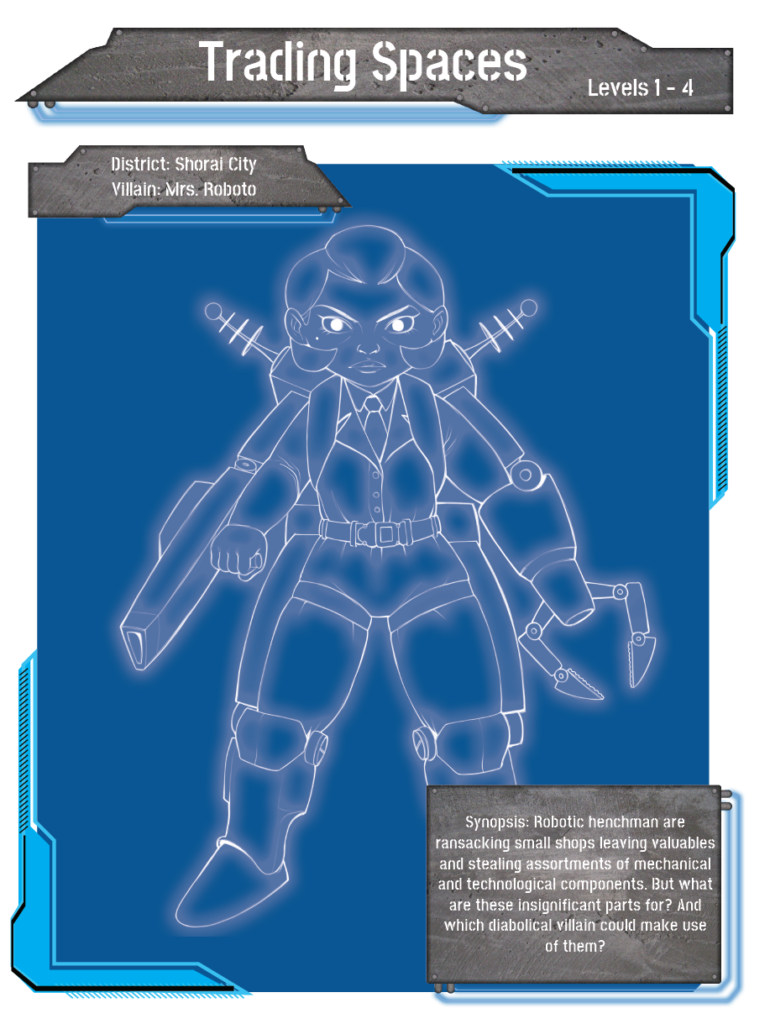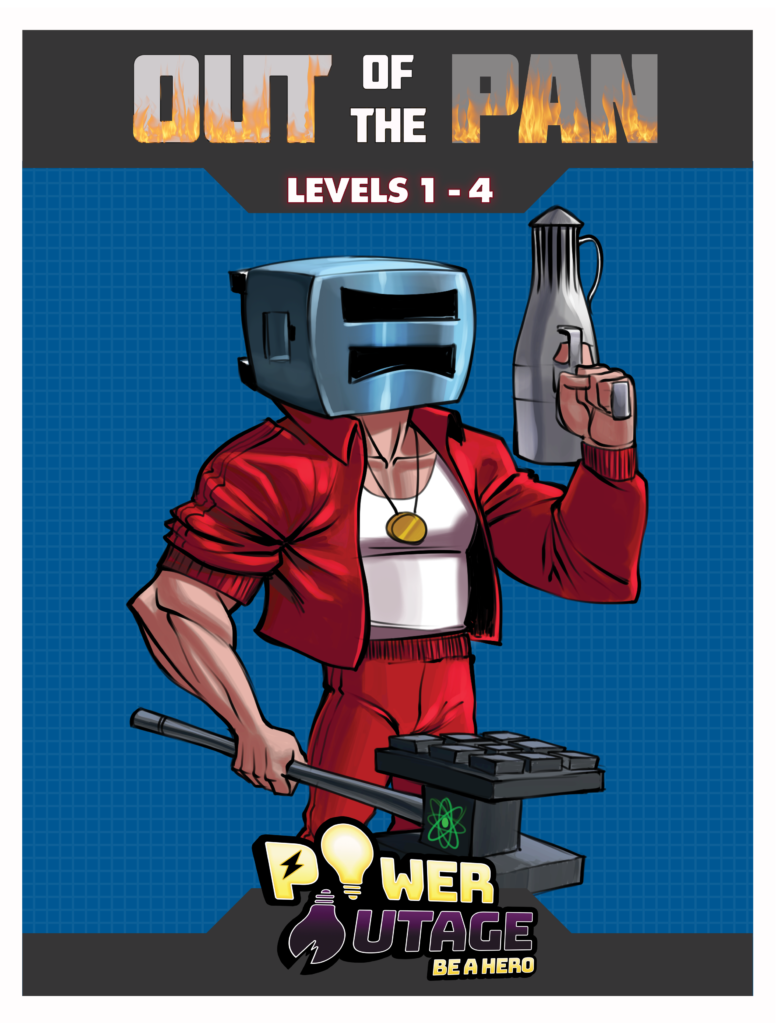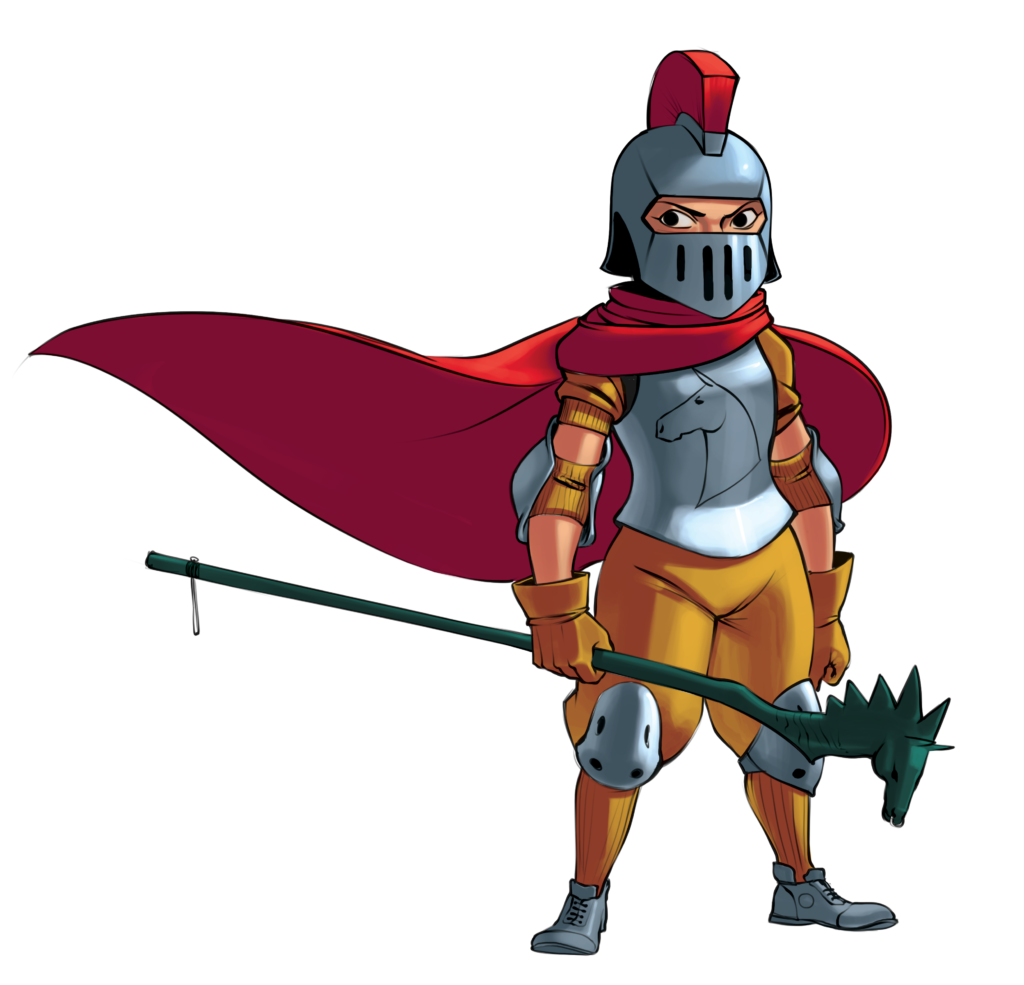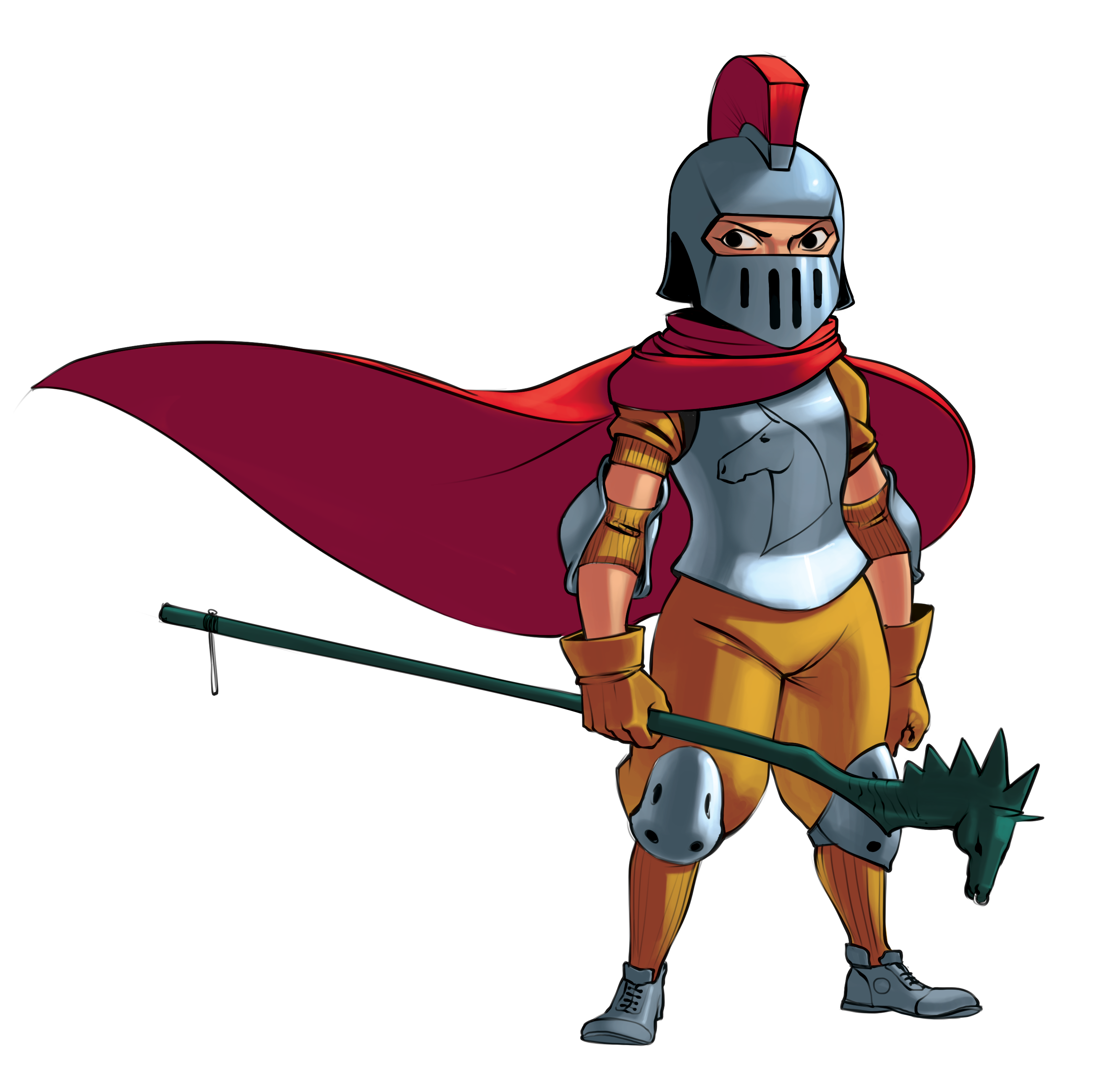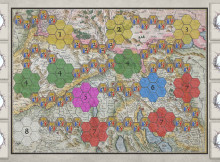The Premise
Loser Gods is a game about the lesser-known slightly irregular gods, in the pantheon of Celestial Deities. In the great high school cafeteria of the heavens, you have your popular jock Gods, Odin, Ra, Athena, Cthulhu, and company. Then you have your less popular gods. Now each of these powerful gods gets their power through their worship, and their worship in kind allows them to support many human champions that fight and adventure in their name. Those champions, in turn, promote the god’s popularity thus increasing their power. It’s a vicious cycle. But the loser gods have decided to team up their efforts in a gamble. Alone they could never afford a hero, but together they could. And at the end of the hero’s journey, the hero could show a declaration of faith to one of the gods. It’s a gamble, but they figure a ⅙ chance of becoming more powerful is better than none.
Game Equipment
Board
Hero or Heroine Figurine
6 sets of 3 Colored D6 Dice (Gold, Blue, and Red), and 1 D20 for the Hero
3 Monster Bags (Journeyman, Heroic, Epic)
1 Love Interest Bag
Several Love interest tokens both male and female and other with corresponding cards
Several Monster Tokens sorted by level (Journeyman, Heroic, Epic)
Corresponding Monster Detail Cards (Serving as the library)
24 Journey Cards 3 at each level with Blank Cards for filling in your own adventures
6 God Cards with Blank Cards for filling in your own loser god
Favor Counters
Supernatural Aide Deck
Game Components
The Pantheons
There are 6 Pantheons at play in the Basic version of the game with Gods and Monsters that correspond to those pantheons.
Norse
Shinto
Horror
Egyptian
Aztec
Greek
The Gods
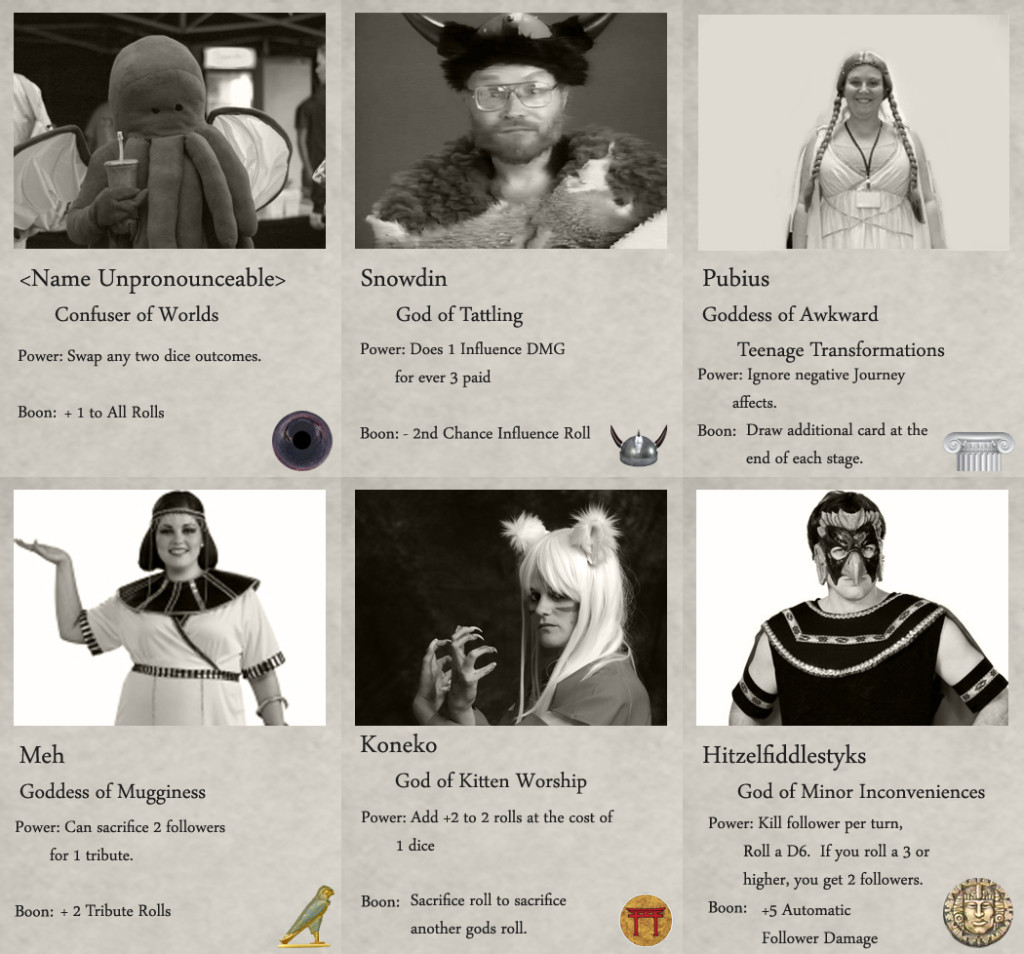
Devotion
Each God has the ability to employ 3 forms of devotion to helping the hero in his journey. These three are also color-coded
Red – Followers
Gold – Tribute
Blue – Influence
Some gods favor certain types of devotion more than others. Likewise, some monsters are either affected by or contain a higher requirement of devotion depending on their pantheon.
Monsters
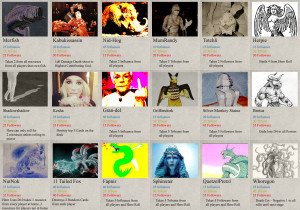
The monsters are sorted into power levels Journeyman (weakest), Heroic (medium), and Epic (hard). They also favor different pantheons. The above example shows Monsters in similar pantheons in columns and power levels by row. Monster cards may have to scale by the number of players. The above cards might assume a standard of 4-5 players. 3 might get a 5 point reduction across the board, 6 might get a 5 point addition. It still requires balancing.
The Hero’s Journey
The hero will travel the actual Hero’s journey as he makes his way through the game. There are 8 stages in total
1. The Call to Adventure
2. Supernatural Aide
3. Crossing the Threshold
4. Road of Trials
5. Meeting the God/Goddess
6. Temptation
7. Apotheosis (climax)
8. The Return
The Journey Cards
Each stage has a set of journey cards. The journey cards affect gameplay up until the end of the next stage. Looking at the board you will see that stages 4 and 7 require 3 monsters to defeat, in which the effect of the journey card remains constant. At the start of the game, the first journey card is turned over. Once the first monster is beaten, and you progress to the next stage, the next journey card is turned over.
Stage 1 Card Examples
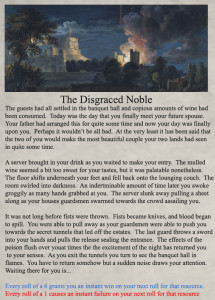
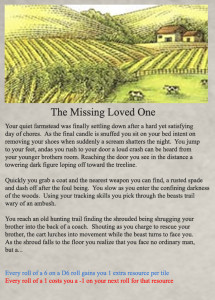
Stage 2 Card Examples
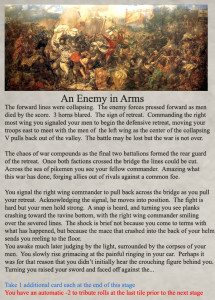
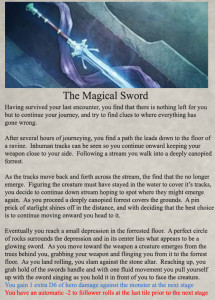
The Board
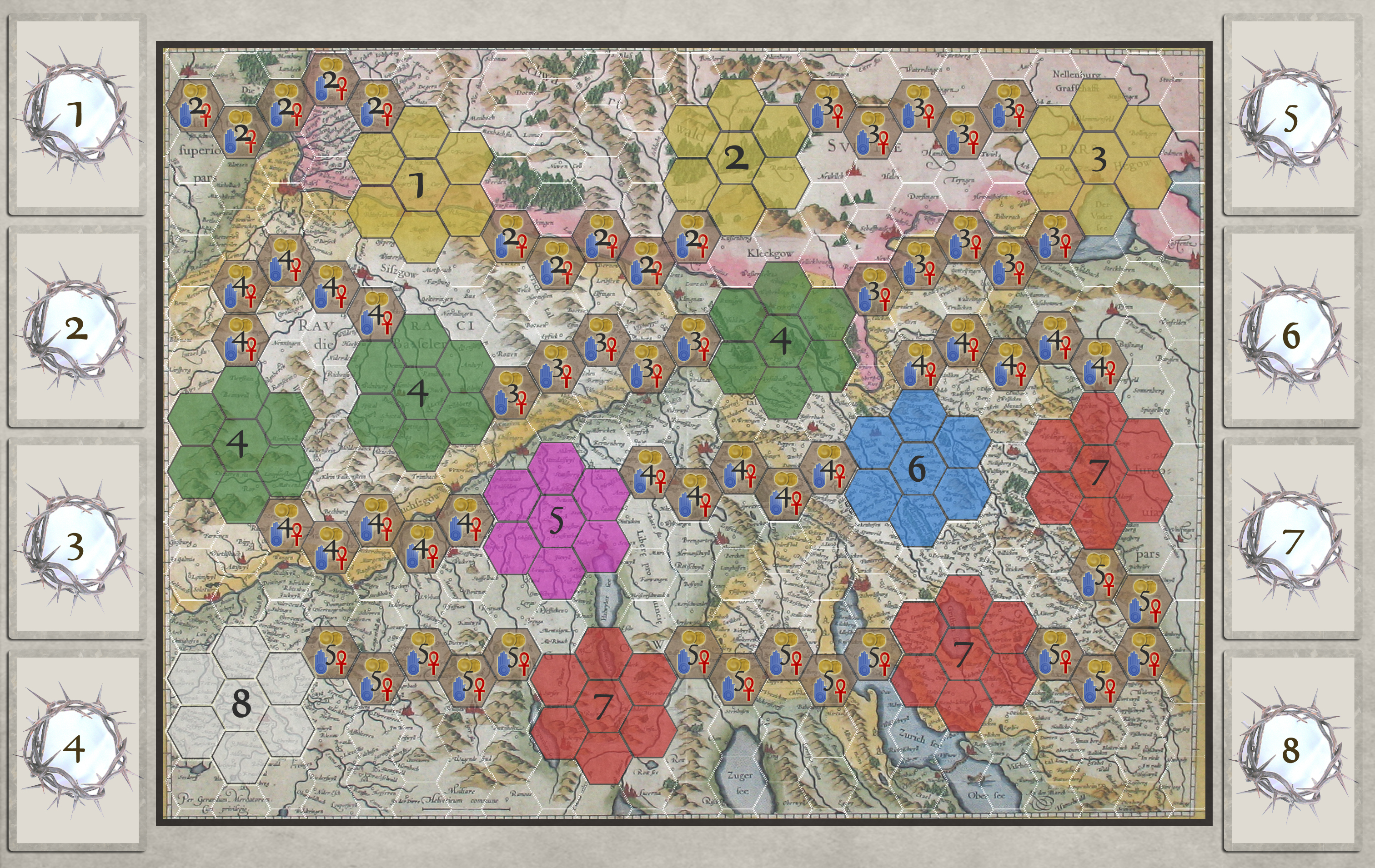
Setup
There are 24 journey cards. 3 for each level. For each level shuffle the Journey card face down, selecting 1 and placing it on the corresponding Journey Card Slot, Face Down.
Fill the appropriate bags with corresponding Journeyman, Heroic, and Epic Monster tokens. Fill the Love interest bag with love interest tokens.
Place the Monster Card deck and Love interest deck on the side (They are reference material so it doesn’t matter if they are face up or down.) Place the Hero figurine in the upper left corner of the board game.
Place the supernatural aid deck face down.
Each player will select a God to play as, either by choice or at random.
Gameplay Summary
The players (as God’s) goal is two-fold. To progress the hero forward through his Journey to reap the benefits of his fame, and to shift the hero’s final outcome to favor them over the other gods. In this manner, Gods must collaboratively work towards the end goal of victory, while at the same time competing against each other for overall dominance.
The hero progresses through the board, and at most stages will confront a monster or more. Depending on which god contributed the most overall points to the destruction of the monster, earns that god a Favor Counter. Favor counters attribute to the final determination of which god earns the Hero’s favor. At the start of the game, the first Journey card is turned over which describes Hero’s Call to Adventure. The Journey card also has stats on it that affect gameplay up until they defeat the monster for that stage. The stages take the players slowly through increased complexity stepping up the difficulty of decisions as they play.
At each tile, the Players roll their 3 dice. The dice must beat the number indicated by the tile that the hero falls on (for example prior to the first and second monster, the minimum number is 2, they must roll a 2 or higher on each dice). For each dice that succeeds the roll, the player earns that minimum number of supporters. The effect of the journey card may impact the rolls. Additionally, the power of the God selected may impact rolls or gameplay. Finally, later, the enhancements of Supernatural aide cards may assist the player.
The God Tally’s up the total number of earned devotion for each of the 3 categories as they progress the hero to the first monster. This works as their devotion bank.
Once they reach a monster, it will require a certain number of points for each of the 3 devotion types to beat. Gods may choose to add as many points from their bank toward defeating the monster as they’d like. These points will reduce the monster’s power.
If the monster still has points in any of the categories, that total number of points must be rolled against by the hero’s D20. If the hero rolls at or above the total monsters’ points, he will succeed.
If he fails he will be devoured and the game is over. The monsters also have an effect on the hero or the Gods themselves that initiates prior to the combats start.
If the hero succeeds then the God who contributed the most total points wins the Favor token for that round. Ties are settled with D20 roll offs.
Gods must be cautious in spending points, because if they overspend early they may have a bad run of luck moving toward the next monster and may have no devotion points to contribute. Not only does that weaken their chance of winning the next round, but it increases the chance that the hero will die.
Gods are allowed to scheme and plot with each other as much as they’d like.
Example Monster Battle
For the first 5 tiles, your 3 players have collected points and are now facing off against a monster
Player 1 = 10 Followers, 2 Tribute, 6 Influence
Player 2 = 6 Followers, 8 Tribute, 8 Influence
Player 3 = 4 Followers, 8 Tribute, 10 Influence
They are facing off against a Totchli with a reduce power due to the number of players
Totchli = 25 Followers, 15 Tribute, 10 Influence
Totchli’s power reduces each God’s followers by 2 but that doesn’t come into play against 3 characters only 4 or more.
Player 1 puts in 10 Followers matched to Player 2’s 6, and Player 3’s 4. They’re all in because this is a heavy stat to beat.
Player 1 refrains from adding any Tribute because he only has two, Players 2 and 3 decide to divvy up the cost with player 2 submitting 7 and player 3 submitting 8.
Player 1 3 points lower than player 2, and 2 points lower than 3. He wants to win this round but has to decide if he wants to let the others win it and keep his resources, or try to beat them at the cost of most of his points. He goes all-in with 6. Player 2 adds the last 4. Player 3 may realize that he’s only a few points away. He adds 6 of his own influence. Now that influence doesn’t impact the monster, but Player 3 has invested more into it.
A bidding war may commence. But assuming the numbers stay the same as indicated.
The power use is as follows
Player 1 expended – 10 followers + 0 Tribute + 6 Influence = 16
Player 2 expended – 6 followers + 7 Tribute + 4 Influence = 17
Player 3 expended – 4 followers + 8 Tribute + 6 Influence = 18
The monster is damaged for a total of 20 followers, 15 Tributes and 10 Influence (with the 6 wasted) by the gods themselves.
The hero now has to roll a D20 or higher against the monster’s total remaining points (5). He succeeds. Player 3 having contributed the most from his bank wins the Token. But at a great cost to his bank.
Stages
Stage 1 – The Call to Adventure
A normal round. Turn the journey card over and read its effects on gameplay. Progress the hero figurine to the first monster and do battle. The monster is pulled from the Journeyman bag as the Yellow field indicates.
Stage 2 – Supernatural Aide
A normal round but the Supernatural Aid Deck is now unlocked. Supernatural Aid cards help the gods help the hero by providing random direct points, protection against monsters, or buffers against missed rolls. The use of these cards continues through the rest of the game. I am currently unsure how often these cards are pulled, what the trigger is, or to what extent Gods are allowed to discard or retain them. Either they will be strong and must be discarded before another can be picked up, or they have the ability to accumulate. The monster is pulled from the Journeyman bag as the Yellow field indicates.
Stage 3 – Crossing the Threshold
A normal round. Turn the journey card over and read its effects on gameplay. Progress the hero figurine to the first monster and do battle. The monster is pulled from the Journeyman bag as the Yellow field indicates.
Stage 4 – Road of Trials
Stage 4 is 3 times as long as the prior stages and requires the defeat of 3 monsters. The journey card is in effect for all 3 areas of this stage. The monsters are now pulled from the heroic bag as the Greenfield indicates.
Stage 5 – Meeting the God / Goddess
This stage functions differently somewhat differently than others. At this stage the hero will pull from the Love Interest bag. The love interest is actually mechanically “fought” in the same way that the monsters are, but a failure will not result in the hero’s death. The love interest carries a boon that attributes directly to the Hero (not the gods) and success in “fighting for his/her love” means the hero carries that boon with him for the rest of the game. Failure means no boon (or potentially negative like psychic damage that affects his rolls)
Stage 6 – Temptation
This is another different stage and I’ve yet to work out the mechanics, but the goal will be for the gods to compete against the hero himself somehow, each tempting him to take up his or her boon over the others. That boon is typically more favorable to the god’s strong suit, but all boons work toward making the hero more powerful overall.
Stage 7 – Apotheosis
The final confrontations of the hero, he must defeat 3 powerful monsters. Monsters are pulled from the epic bag. The minimum roll counters are now at 5 which gives an unaided roll a mere ⅓ chance of success, but there might be supplemental aide coming from The Journey Cards stats, the supernatural aids, the love boon, or the gods boon, or the god’s inherent power.
Stage 8 – The Return
The hero has survived his trials but now it is time to choose a god. Some mechanic needs to be developed that weighs The number of Favor Tokens vs the Total Devotion Bank, and a potentially randomized roll. The winning God gets to tell the story in any way he or she likes about the fate of the hero as well as the pantheon of gods themselves. They basically get to claim how the story ends.
